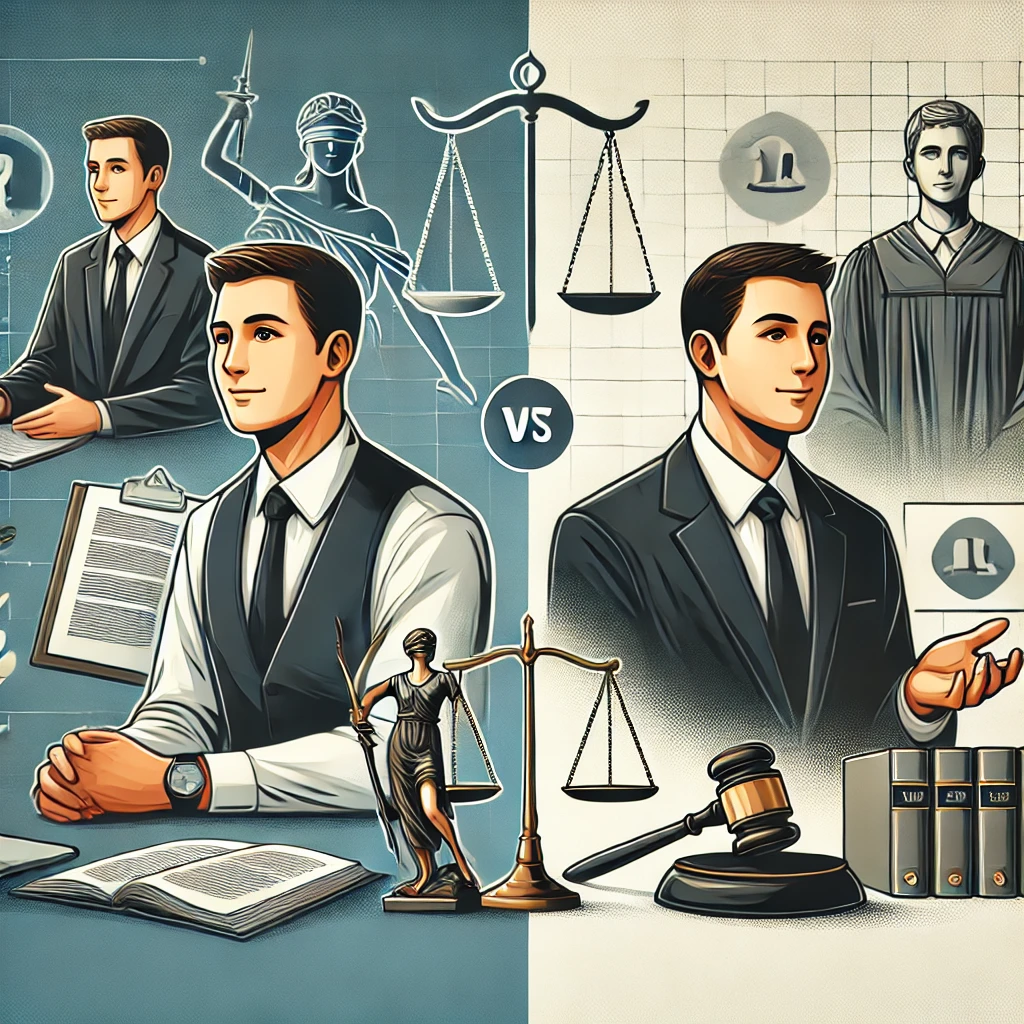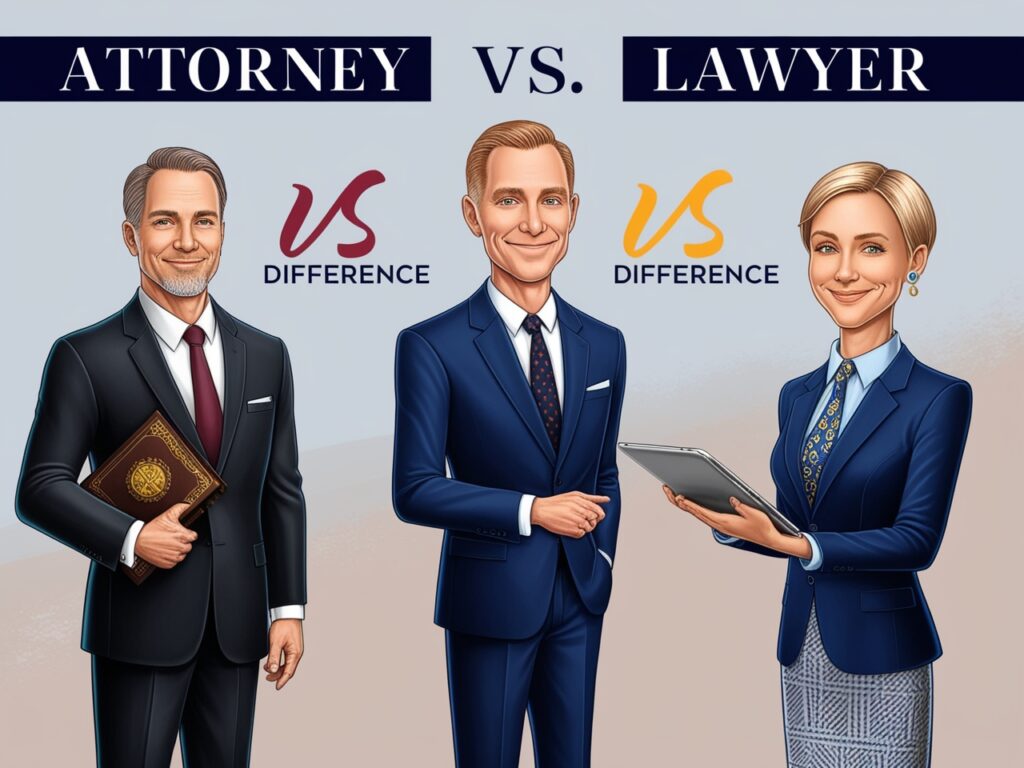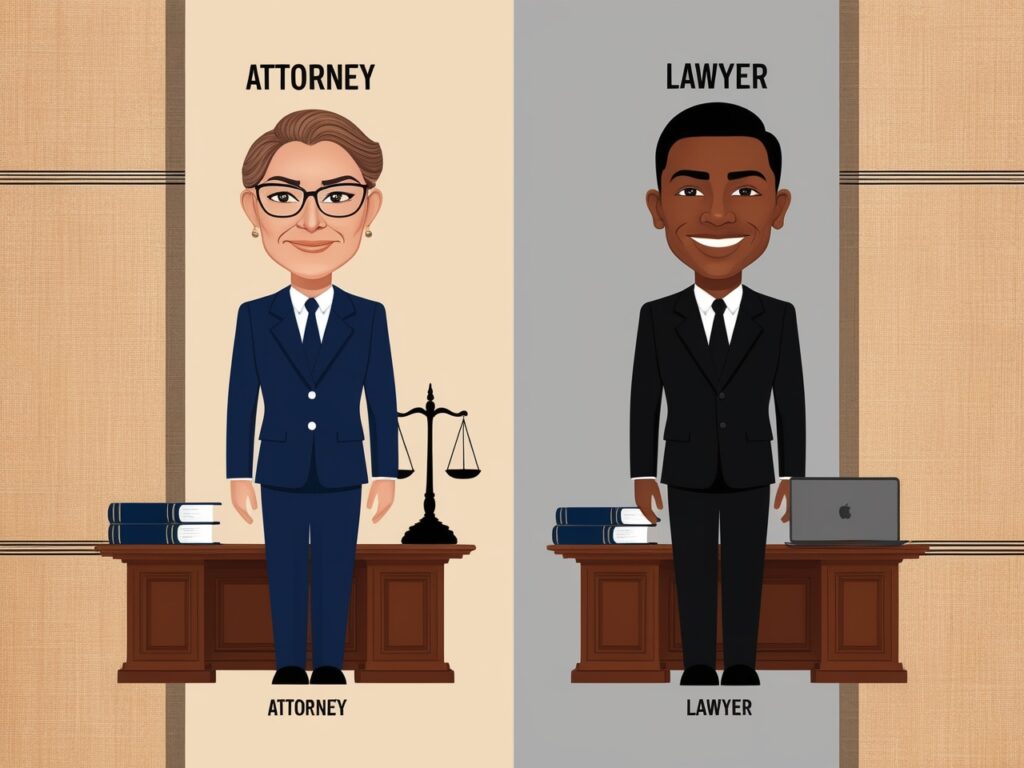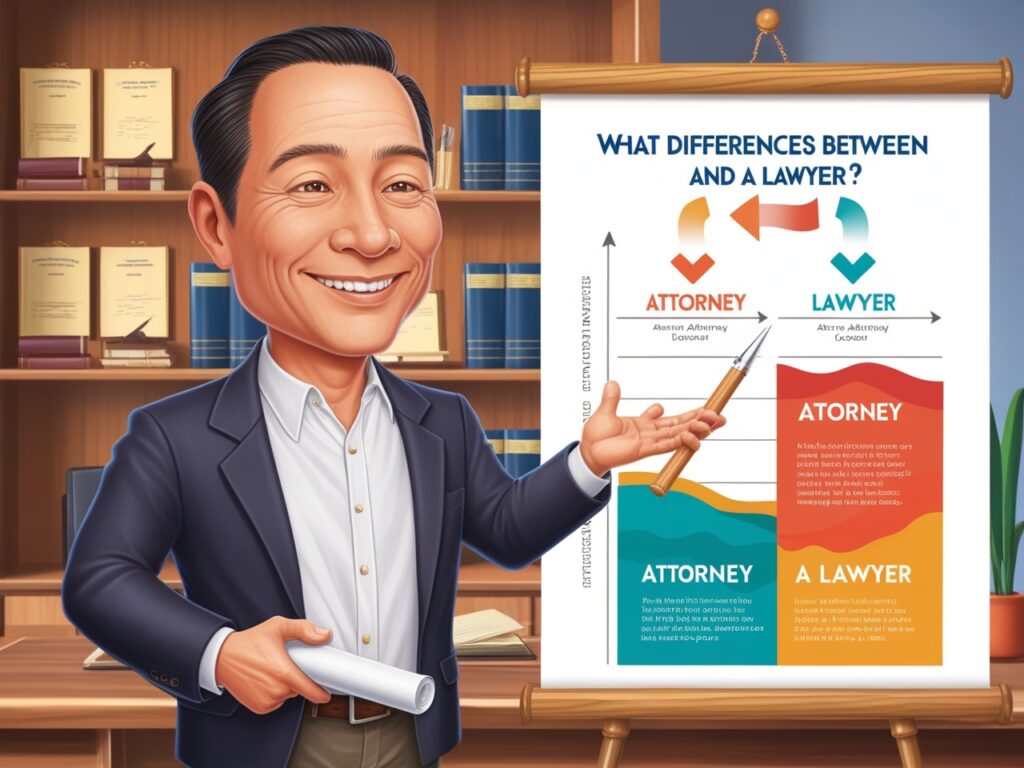When navigating the legal world, understanding the difference between attorney and lawyer is essential. These terms are often used interchangeably, but they represent distinct roles within the legal profession. Knowing this difference can save time and ensure you choose the right legal professional for your needs.

Introduction
When faced with legal challenges, understanding whom to consult—an attorney or a lawyer—can make a significant difference. While both terms refer to professionals knowledgeable in law, their roles and qualifications can differ depending on jurisdiction and context.
What Is a Lawyer?
Definition
A lawyer is a broad term used for someone who has studied law and may provide legal advice. However, not all lawyers are licensed to represent clients in court.
Roles and Responsibilities
- Providing legal advice and guidance
- Drafting legal documents like contracts and wills
- Specializing in areas such as tax law, intellectual property, or corporate law
Educational Path
- Undergraduate Degree: Any field, though pre-law or political science is common
- Law School: Completing a Juris Doctor (JD) program
- Bar Exam (Optional): For those wishing to represent clients in court
What Is an Attorney?
Definition
An attorney is a lawyer who has passed the bar exam and is licensed to represent clients in court. In many jurisdictions, the term “attorney-at-law” is used.
Roles and Responsibilities
- Representing clients in legal proceedings
- Advocating for clients in court
- Negotiating settlements
- Offering legal advice
Educational Path
- Similar to that of a lawyer
- Must pass the bar exam and maintain licensure

Differences Between Attorney and Lawyer
By Definition
- Lawyer: Refers to anyone educated in the law.
- Attorney: A lawyer who practices law in court after passing the bar exam.
By Licensing
- Lawyers: May not necessarily have passed the bar exam.
- Attorneys: Must have passed the bar exam and obtained a license.
By Scope of Practice
- Lawyers: Often work in advisory roles or non-litigation fields.
- Attorneys: Can represent clients in litigation and court settings.
Legal Practices Across Countries
United States
In the U.S., the terms “attorney” and “lawyer” are often used interchangeably. However, attorneys are those legally authorized to practice law in court.
United Kingdom
In the UK, legal professionals are categorized into barristers and solicitors, with roles akin to attorneys and lawyers, respectively.
Other Regions
In many countries, the distinction between attorneys and lawyers may not exist, or different terminologies are used.

Similarities Between Attorneys and Lawyers
- Both require a legal education.
- Both may offer legal advice.
- Both can specialize in various legal areas.
Key Scenarios to Consult Attorneys or Lawyers
- Legal Documentation: Lawyers are suitable for drafting contracts.
- Court Representation: An attorney is necessary for litigation cases.
- Specialized Advice: Depending on the case, either can be suitable.
Pros and Cons of Hiring Attorneys vs. Lawyers
Attorneys
Pros:
- Court representation
- Full legal authority
Cons:
- May cost more
Lawyers
Pros:
- Cost-effective for non-litigation tasks
- Ideal for consultation and document preparation
Cons:
- Limited authority in legal proceedings

Why Understanding the Difference Between Attorney and Lawyer Matters
When dealing with legal matters, clarity is crucial. Misunderstanding the difference between attorney and lawyer can lead to hiring the wrong professional for your case. For example, a lawyer might be ideal for legal advice, but an attorney is necessary for court representation. Knowing the distinctions ensures better decisions and more efficient outcomes.
Common Misconceptions About Attorneys and Lawyers
Attorneys and Lawyers Are the Same
Many believe that attorneys and lawyers are synonymous. However, while all attorneys are lawyers, not all lawyers are attorneys. The distinction lies in licensing and legal authority.
Lawyers Can Always Represent Clients in Court
A common myth is that any lawyer can argue in court. Only an attorney, who has passed the bar exam, has the legal authority to represent clients in litigation.
Attorneys Are Superior to Lawyers
This isn’t necessarily true. The difference is functional rather than hierarchical, depending on the context and legal requirements.

Career Paths for Lawyers and Attorneys
Career Opportunities for Lawyers
Lawyers have diverse career paths, including:
- Corporate Counsel: Providing legal guidance to corporations.
- Legal Consulting: Advising businesses on regulatory compliance.
- Academia: Teaching law or conducting legal research.
Career Opportunities for Attorneys
Attorneys often focus on litigation and advocacy, with roles such as:
- Criminal Defense Attorney: Representing defendants in criminal cases.
- Personal Injury Attorney: Advocating for victims seeking compensation.
- Family Law Attorney: Handling cases related to divorce, custody, and adoption.
The Importance of Licensing for Attorneys
The difference between attorney and lawyer is often defined by licensure. Licensing, achieved by passing the bar exam, grants attorneys the authority to:
- Represent clients in legal proceedings.
- Sign legal documents on behalf of clients.
- Act as official legal representatives in court.
For lawyers without a license, their expertise is typically limited to advisory and preparatory roles.
Ethical Responsibilities of Attorneys and Lawyers
Both attorneys and lawyers adhere to strict ethical guidelines. However, attorneys bear additional responsibilities due to their authority to represent clients in court. These include:
- Upholding confidentiality and privilege.
- Avoiding conflicts of interest.
- Ensuring fair representation in legal proceedings.
Lawyers not practicing in court focus more on integrity in advice and documentation.
Choosing the Right Legal Professional
If you’re unsure whether you need an attorney or a lawyer, consider your situation:
- For legal advice or document drafting, a lawyer may suffice.
- For court cases or complex legal negotiations, an attorney is essential.

FAQs
1. Can all lawyers represent clients in court?
No, only lawyers who pass the bar exam and are licensed can represent clients in court.
2. Is an attorney more qualified than a lawyer?
Not necessarily. The distinction lies in licensure and the ability to practice in court.
3. Are attorneys and lawyers the same worldwide?
No, terminology and roles vary by jurisdiction.
4. Do I need an attorney or a lawyer for drafting contracts?
A lawyer is sufficient for drafting contracts.
5. What is the bar exam?
It is a licensing exam that a lawyer must pass to become an attorney.
6. Can an attorney give legal advice?
Yes, attorneys can provide legal advice and represent clients in court.
7. Can a lawyer call themselves an attorney?
Only if they have passed the bar exam and obtained a license.
8. Is a solicitor the same as an attorney?
In the UK, a solicitor is closer to a lawyer, while barristers are akin to attorneys.
9. Are there lawyers who never become attorneys?
Yes, some lawyers choose careers in academia, consulting, or corporate roles.
10. How do I choose between an attorney and a lawyer?
Assess your legal needs—consult an attorney for court cases and a lawyer for non-litigation tasks.
Final Thoughts
Understanding the difference between an attorney and a lawyer can help you make informed decisions when seeking legal assistance. While attorneys are authorized to represent clients in court, lawyers are versatile professionals who can provide valuable legal advice and services. By knowing your needs and the qualifications of these professionals, you can navigate legal challenges with confidence.








